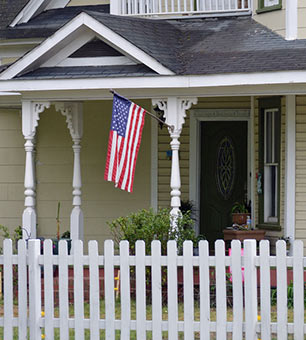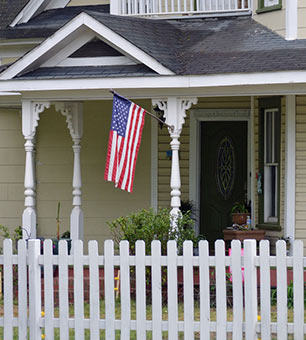Did you know that Truthout is a nonprofit and independently funded by readers like you? If you value what we do, please support our work with a donation.
 (Photo: Donald Lee Pardue / Flickr)We all know people who prefer cozier psychic climes to those offered up by reality. They’re ubiquitous; the place is lousy with them. They constitute what might be a solid (if hardly silent) majority in the United States today. Folks incapable of entertaining mental states much north of Miami. The insufferably faux cheery manager. The always look-on-the-bright-side friend. The bad news avoider. These people likely even include ourselves from time to time.
(Photo: Donald Lee Pardue / Flickr)We all know people who prefer cozier psychic climes to those offered up by reality. They’re ubiquitous; the place is lousy with them. They constitute what might be a solid (if hardly silent) majority in the United States today. Folks incapable of entertaining mental states much north of Miami. The insufferably faux cheery manager. The always look-on-the-bright-side friend. The bad news avoider. These people likely even include ourselves from time to time.
Who doesn’t want to “stay calm and carry on” or “don’t worry, be happy”? What sane person prefers sour or angry moods to the buoyant? But the preference for Zen over Zinn doesn’t change reality; it makes reality harder to change. And it’s plain irresponsible or downright dishonest to substitute counterfeit preoccupations for unflinching analysis.
It’s not just Fox News. New York Times columnist David Brooks has made a career of helping conservatives avoid uncomfortable truths. Brooks is not as bad as Roger Ailes’ mad stable of professional prevaricators, of course, but he has a more prestigious perch.
His February 10, 2014, column – “The American Precariat” – stands as a fine example of Brooks’ peculiar brand of pseudo-intellectual, soft right, victim-blaming reality dodging. Brooks sees the world through old-fashioned, moralistic and mythical American Exceptionalist lenses set in generational conflict culture war frames. Were he British, he’d sit in the House of Lords.
He’s mildly perturbed (not being the type to get genuinely outraged) by the news that Americans are now less mobile, that they move less today than they did some decades ago (although the decline is not precipitous: 20 percent of Americans moved in 1950; 12 percent at present). He finds related stats for duration of tenure in a particular abode (people stayed in the same house for a mere five years in the ’50s and ’60s; it’s up to 8.6 years today). We’re “no more mobile than people in Denmark or Finland” (as if this is necessarily a bad thing; Scandinavians tend to live superior lives compared to Americans), and Brooks is worried.
He’s honest enough (which is what distinguishes him from many pundits on the right) to examine “a few theories that offer partial explanations, but only partial ones” as to why this might be so. These “theories” include an aging population (old folks are less geographically mobile) and the relocation difficulties faced by people burdened by underwater mortgages.
Yet young people are not moving as much as they used to, Brooks tells us, and neither are renters – so that can’t be it. Growing job homogeneity across regions – why move if the jobs in Pittsburgh are the same as those in Atlanta? – doesn’t cut it for Brooks either.
Instead, “a big factor here is a loss of self-confidence.”
It takes faith to move. You are putting yourself through temporary expense and hardship because you have faith that over the long run you will slingshot forward. Many highly educated people, who are still moving in high numbers, have that long-term faith. Less-educated people often do not.
Brooks thus gives us a choice. We can explain decreased mobility among the working class as a function of the decline in living standards; the collapse of labor unions; the erosion of real wages; the evaporation of manufacturing jobs through offshoring, computerization and tax and trade policy; the significant increase in housing prices and rents in many communities; the unwillingness of banks to offer or refinance mortgages on affordable terms; the widespread assumption of massive credit card and student loan debt; and the nontrivial expense of relocation in sum as a predictable outcome of decades of pauperization. Or we can explain it as a loss of faith, a moral failing, a weakness of character on the part of the “less educated.”
Brooks is also puzzled that those people who are moving are not headed to “low unemployment/high income areas,” the sort of place Brooks would move to.
Instead they are moving to lower-income areas with cheap housing. That is to say, they are less likely to endure temporary housing hardship for the sake of future opportunity. They are more likely to move to places that offer immediate comfort even if the long-term income prospects are lower.
We have another choice. We can be surprised that people without jobs or with lousy or part-time jobs, saddled by debt, having cobbled together the hundreds or more likely thousands of dollars necessary to pay first month’s rent, last month’s rent (in some places) and probably a security deposit equivalent to a month’s rent, or who scrimped for years to sock away a down payment, might be averse to “temporary housing hardship.” Or not.
But Brooks doesn’t see it this way – given the curvature of his lenses. There’s got to be more to the story, some individual or collective moral failure, upon which we can pin American decline.
It’s not enough that Brooks has probably never been evicted because he couldn’t make the rent, never had his home foreclosed on, never had to choose between paying the landlord or the bank, the credit card company or the power utility. No, he also questions the grit of those who must seek “immediate comfort.”
Brooks finds further evidence for Americans’ loss-of-faith-as-moral-failing. Fertility rates (“a good marker of confidence”) are down, “people are less likely to vacate a job in search of a better one,” and a mere 46 percent of Americans “believe they have a good chance of improving their standard of living.” Worse yet, a decline of “faith in capitalism, a classless society, America’s role in the world and organized religion” has Americans indistinguishable from Europeans. “And when you just look at young people, American exceptionalism is basically gone.”
Uncertain why people one paycheck from catastrophe might choose not to reproduce? Good thing abortion and contraceptive rights are not under attack across the country. Surprised that someone might hold on to the job she has rather than risk penury for the ever-more-elusive “better one”? Perhaps workers might someday receive unemployment benefits when they voluntarily leave a job. Taken aback that nearly half of Americans now realize (correctly) that social mobility is a thing of the past for four out of five of them? Confused why people under siege by corporations and the 1% who own them, without consequential assistance from impotent (or worse) churches, might “lose faith” in the American Dream?
Brooks’ disappointment in and disapproval of his (younger) countrymen continues.
Fifty percent of Americans over 65 believe America stands above all others as the greatest nation on earth. Only 27 percent of Americans ages 18 to 29 believe that. As late as 2003, Americans were more likely than Italians, Brits and Germans to say the “free market economy is the best system on which to base the future of the world.” By 2010, they were slightly less likely than those Europeans to embrace capitalism.
Thirty years ago, a vast majority of Americans identified as members of the middle class. But since 1988, the percentage of Americans who call themselves members of the “have-nots” has doubled. Today’s young people are more likely to believe success is a matter of luck, not effort, than earlier generations.
Brooks calls these completely reasonable attitudes and amazingly accurate self-assessments, these inevitable consequences of the dismantling of the American Dream, “pessimistic views,” as if those who held them simply needed to think positively and regain their confidence. Brooks fails to connect the historical dots: He apparently doesn’t understand that it was the conservative policies of austerity, retrenchment and corporate welfare over this same period – pushed both by Republicans and many Democrats and cheered by Brooks – that pushed people into the ranks of the have-nots.
Even when borrowing a catchy meme from a British academic, the sort of thing Brooks loves to do, he can’t help but sermonize. The precariat is just what it sounds like, the growing class of workers (often young) with temporary or part-time work teetering on the edge of homelessness and hunger. Brooks describes the American precariat as “hunkered down, insecure, risk averse, relying on friends and family but without faith in American possibilities. This fatalism is historically uncharacteristic of America.” Yet again, clear-eyed realism about a miserable situation – a reality painfully experienced, violently imposed and with no prospects for improvement – Brooks converts into a character flaw of a whole class of unfortunates.
Finally, Brooks feels compelled to offer policy prescriptions. If you expected a higher minimum wage, universal single-payer health care, fair trade over “free trade,” massive investment in affordable housing, student loan forgiveness, state banks, ecological restructuring to weather climate change, public child care or pre-K, paid family leave, increased Social Security benefits – to name just a few urgently needed programs – you’d be disappointed. Nope, Brooks cites an idea from some guy with the American Enterprise Institute, that bastion of human kindness and fellow feeling: moving vouchers for the long-term unemployed so that “the old future-oriented mind-set [might] return.”
Press freedom is under attack
As Trump cracks down on political speech, independent media is increasingly necessary.
Truthout produces reporting you won’t see in the mainstream: journalism from the frontlines of global conflict, interviews with grassroots movement leaders, high-quality legal analysis and more.
Our work is possible thanks to reader support. Help Truthout catalyze change and social justice — make a tax-deductible monthly or one-time donation today.
